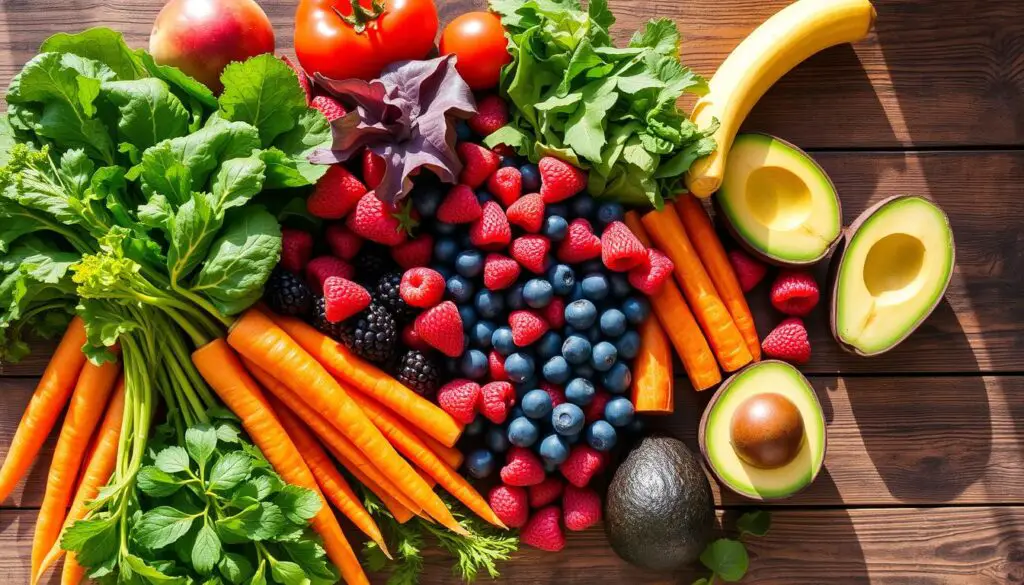Every day, we make choices about what we eat. Feeling energized after eating something good is clear. But, quick and processed foods can distract us. Making healthy food choices can seem hard in our busy lives.
Yet, it’s not that hard. Adding healthy eating to our daily routine can make us feel better physically and mentally. Choosing the right foods is a simple yet powerful step toward a healthier life.

Choosing healthy foods is key to our well-being. It helps prevent diseases and improves our life quality. By focusing on healthy eating, we not only feel better physically but also mentally. This guide will help you make better choices for your health.
Key Takeaways
- Incorporate at least 5 portions of fruits and vegetables into your daily diet.
- Base each meal on starchy carbohydrates like potatoes, rice, or whole grains.
- Aim for 2 portions of fish per week for balanced nutrition.
- Limit saturated fat to maintain heart health.
- Stay hydrated by drinking 6 to 8 glasses of fluid each day.
- Be mindful of your intake of discretionary foods, focusing on whole, nutrient-dense foods instead.
Understanding Nutritious Eating Habits
Starting a journey to eat better begins with picking quality ingredients. Choosing the best ingredients makes meals taste better and boosts their nutritional value. It’s important to handle and store these ingredients right to keep them fresh.
Using fresh produce and whole foods is key to clean eating. It helps create a diet that’s balanced and full of important nutrients.
The Importance of Quality Ingredients
Quality ingredients are the base of a healthy life. They give our bodies the nutrients they need to function well. Eating clean means choosing:
- Fresh fruits and vegetables
- Whole grains
- Lean proteins
- Healthy fats
These foods add variety to our diets and help us make better choices. Knowing what we eat helps us live longer and avoid health problems linked to processed foods.
Guidelines for a Balanced Diet
Eating a balanced diet is crucial. It means eating a variety of foods from all groups. For a 2,000 calorie diet, here’s what’s recommended:
- At least 5 portions of fruits and vegetables
- 2 portions of fish, with one being oily
- Limiting saturated fat to 20g for women and 30g for men
- Keeping salt intake below 6g a day
- Staying hydrated with 6 to 8 glasses of fluids
These guidelines help us eat a wide range of foods. This makes our meals more nutritious and supports our health. By making healthy choices, we can lead a healthier life.

Healthy Food Choices to Consider
Making smart food choices is key to staying healthy. The right foods boost our health and energy. Here are some tips for a healthier lifestyle.
Choosing Nutritionally Dense Foods
Nutritionally dense foods are packed with nutrients and low in calories. Eating fruits, veggies, whole grains, and lean proteins is a good start. For example, blueberries, strawberries, and oranges are full of vitamins and antioxidants.
Lean proteins like eggs, chicken, and salmon are also great. They provide important nutrients without too many calories.
Opting for Fresh Food Options
Choosing fresh foods is crucial for clean eating. Fresh veggies like broccoli, bell peppers, and carrots are full of vitamins. Eating these foods boosts your health and energy.
Adding nuts, seeds, and legumes to your diet is also beneficial. They increase nutrient intake and provide dietary fibers.
Exploring Organic Nutrition
Organic foods are free from harmful chemicals found in conventional farming. Opting for organic fruits, veggies, and grains is good for your health and the planet. Studies show organic foods may have more antioxidants and nutrients.
By choosing organic, you support your health and the environment. It’s a positive step for both your wellness and the ecosystem.

Conclusion
Choosing healthy foods is key to a wellness-focused lifestyle. With nearly 25% of American kids facing obesity, it’s more important than ever. Understanding quality ingredients and balanced diets can greatly improve our health.
It’s also crucial to see the long-term benefits of smart food choices. Teaching kids about healthy habits and involving families in meal planning can fight obesity. The family is a strong support for healthy living, making meals together a special time.
In short, eating fresh and organic while avoiding processed foods leads to a healthier future. Committing to healthy eating benefits us now and for future generations. Let’s make better food choices for a happier, healthier life.






